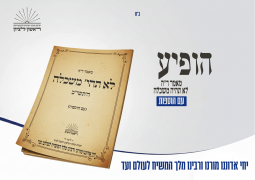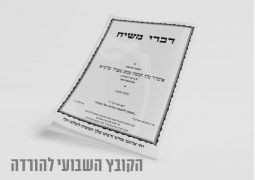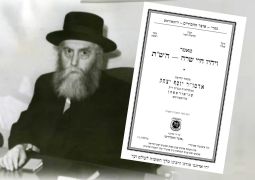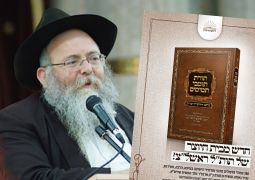- ב"ה ימות המשיח!
- כ"ד שבט התשפ"ו (11.02.2026) פרשת משפטים
משיח בפרשה בשלוש שפות - פרשת צו
- אתר הגאולה
- 0
- י"א אדר ב' התשע"ט, 18.03.2019, 13:12

דרשת משיח בפרשה צו תשעט
להורדה PDF לשון הקודש צרפתית אנגלית
להגיד תודה בגאולה
מבוסס על ד"ה מזמור לתודה תשי"ז, שיחת דברים תנש"א
במסגרת שיעורי הבית ביקש המורה מתלמידי כיתה ו' לכתוב חיבור בנושא: "מה זה לומר תודה''?
כל אחד מהתלמידים ניסה להביע את עצמו ודעותיו בחיבור, כיד ה' הטובה עליו.
מתוך שלל החיבורים שהוגשו למורה, בלט במיוחד החיבור של אורי…
לפני שנדבר על החיבור, נספר לכם קצת על אורי. אורי הוא ילד תוסס ושובב, מלא מרץ ורעיונות, שישיבה בכיתה והקשבה לשיעורים אינה בדיוק הדבר החביב עליו, בלשון המעטה…
אורי כתב חיבור בן שורה אחת בלבד, ''להגיד תודה זה כמו שיעורי בית!"
המורה הסתקרן לדעת למה בדיוק התכוון אורי במשפט/סיסמא הזאת. ''אולי הוא התכוון לומר, שכמו שיעורי בית זה דבר חשוב, כך גם אמירת תודה?! או שמא הכוונה היא שאמירת תודה באמת מצריכה תשומת לב למחשבה כמו שיעורי בית?!"
החליט המורה לשאול את אורי בעצמו. "אורי, למה התכוונת במשפט העמוק הזה?"
''פשוט מאוד!" ענה אורי "להגיד תודה זה כמו שיעורי בית… את שניהם, אני לא עושה!!!"
השבוע נקרא את פרשת צו, המלמדת אותנו על סדר העבודה היום-יומי במשכן ובמקדש (תרומת הדשן, סידור המערכה וכו') ועל מספר קורבנות נוספים אותם ניתן להקריב כנדבה. הפרשה מסיימת בתיאור "שבעת ימי המילואים" (שהחלו בכ"ג באדר) - ימי ההכנה וההקדשה של המשכן, כליו והעובדים בו (הכהנים) בעיקר.
אחד מהקורבנות המוזכרים בפרשתנו הוא קרבן תודה. התורה מלמדת אותנו, שכאשר יהודי רוצה להודות להקב"ה על החסד והנס שהוא גמל איתו - עליו להקריב קרבן. הקרבת תודה (או, לחילופין, אמירת תודה) היא דבר קשה לרבים מאיתנו. קשה לנו להכיר בחסרונות ובחולשות הקיימים בנו, ולהודות להקב"ה (או לזולת) על החסדים שעשה איתנו. יחד עם זאת, חשיבותה של (אמירת או הקרבת) התודה, בעיני התורה, היא מרכזית ועיקרית.
נוכל ללמוד את חשיבות התודה ע"י עיון קל בדברי המדרש:
"לעתיד לבא כל הקורבנות בטלין, וקרבן תודה אינו בטל. כל התפילות בטלות, וההודאה אינה בטלה" (ויקרא רבה ט,ז)
מדוע לא יתבטל קרבן התודה לעתיד לבא? מדוע מכל התפילות תשאר רק תפילת ההודאה ("מודים")?!
התשובה נעוצה בהבנת המשמעות העמוקה של מילה "תודה". האדמו"ר הזקן (אגה"ק סי' טו) מסביר שמלבד הביאור הפשוט והמילולי של המילה - "להגיד תודה", יש למילים "תודה/הודאה/מודים" משמעות פנימית, עמוקה ביותר.
דמיינו לעצמכם, ויכוח תלמודי בין רבי מאיר לשאר חכמי ישראל. על רבי מאיר נאמר ש"לא יכלו חבריו לעמוד על סוף דעתו", עומק דבריו של רבי מאיר תמיד נשאר עלום, חבוי ונסתר. חבריו הבינו שהצדק איתו, אלא שהם לא היו מסוגלים להבין ולהפנים זאת, מכאן צמח לו הביטוי התלמודי: "מודים חכמים לרבי מאיר". חכמי ישראל חשבו והבינו אחרת, הם ראו את הדברים באור שונה, ומכל מקום הם הסכימו שרבי מאיר צודק! הוא צודק, גם אם אנו לא מבינים או רואים את הדברים עין בעין!
להודות - הכוונה לקבל. לקבל את האמת גם אם זה לא מסתדר לי בראש; גם אם יש לי קושיות, שאלות, טענות ומענות. "קבל את האמת ממי שאמרה" גם אם הוא לא בדיוק הטיפוס שלך, החבר שלך או הידיד שלך. קבל את האמת כי היא אמת, ותו לא!
קל לנו לקבל דברים הגיונים, דברים אותם אנו מבינים. קשה לנו להסכים עם מישהו שאומר דברים שהם "מעל" לראש שלנו, למרות שאנו יודעים שהוא, אכן, צודק!
להודות - הכוונה להתבטל. לבטל את השכל ו/או הרגשות לאמת האלוקית כפי שהיא, וכך להתבטל למהות עליונה יותר, אותה אין האדם מסוגל להבין.
וכך כותב שם האדמו"ר הזקן: "ואף שאין אנו משיגים איך הוא הכל אפס ממש קמיה - אעפי"כ מודים אנחנו בהודאה אמיתית שכן הוא באמת לאמיתו"
לאור האמור, מובן מדוע דוקא קרבן התודה ותפילת ההודאה ישארו לעתיד לבא.
שאר הקורבנות היחיד כחטאת או אשם באים לכפר על האדם החוטא, אפילו קרבן עולה (או שלמים) מגיע כדי לכפר על הרהור הלב. מכיון שלעתיד לבא "ואת רוח הטומאה אעביר מן הארץ" ולא יהיו עוד חטאים ועוונות - לכן יתבטלו כל הקורבנות!
הדבר נכון גם בכל הקשור לתפילה. משמעותה של התפילה היא בקשת צרכיו של האדם מהבורא. פרנסה, רפואה, שלום בית ועוד, הם רק חלק ממה שאנו צריכים ומבקשים מהקב"ה. מכיון שלעתיד לבא "כל המעדנים מצויין כעפר" וכל החולים יתרפאו - באופן טבעי לא יהיה לנו מה ועל מה לבקש, ולכן "כל תפילות עתידות להבטל".
הכל חוץ מה... תודה והודאה!
בימות המשיח תתגלה בעולם המציאות האלוקית האמיתית. התגלותו האינסופית של הבורא בעולם תביא להתבטלות מוחלטת של האדם והבריאה כלפי ה'. אם כיום, שהאמת האלוקית מוסתרת - אנו מבינים שעלינו להתבטל למשהו או מישהו עליון יותר, הרי שבימות המשיח, הדבר יהיה נכון אלף פעמים ככה! הביטול רק יגדל ויתעצם, הרגשת האפסיות האנושיות מול עוצם גדולת וקדושת הבורא יהיו ברמה הגבוהה ביותר. וזוהי, בדיוק, המשמעות של קרבן התודה ותפילת ההודאה! להתבטל לאמת באמת!
לאור האמור, ניתן לומר בבטחה שלא רק ש"קרבן תודה לא יתבטל", אלא שדווקא אז, לעתיד לבא, נוכל להביא את (קרבן) התודה האמיתי, רק אז נחוש ונרגיש באמת, מה זה להתבטל! מה המשמעות בל"קבל את האמת"!
ברוח הדברים ניתן להזכיר את דברי הרבי בשבת חזון תנש"א:
"...תיכף ומיד ממש - תבוא כבר הגאולה, ואזי נחגוג את השמחה הכי גדולה, שמחה שלמעלה מכל מדידה והגבלה - השמחה על זה שבאה הגאולה האמיתית והשלימה ע"י משיח צדקנו, ויביאו ע"ז קרבן תודה על היציאה מ"בית האסורים" הכללי דהגלות )במכל שכן מזה שיחיד מחויב בקרבן תודה ע"ז שהוא - יחיד - יוצא מבית האסורים הפרטי"
ונסיים בסיפור: באחד ממעמדי חלוקת הדולרים בימי ראשון בשנת תש"נ, הגיע יהודי לרבי שביקש ברכה לרפואה שלימה עבור רעייתו שלא היתה בקו הבריאות. לאחר שהרבי בירך את אשתו, הודה אותו יהודי לרבי על ברכתו במאור פנים ובחיוך לבבי. הרבי ענה לו: תודה רבה לך, על שנתת לי אפשרות לברך יהודי!
באם הרבי מודה לנו על האפשרות לברך יהודי, כמה עלינו להודות לרבי על הזכות הנפלאה שנפלה בחלקנו להיות מחסידי חב"ד בדור השביעי - הדור האחרון של הגלות והדור הראשון של הגאולה!
גם אם אנחנו לא מבינים איך ולמה, גם אם קשה לנו להסביר כיצד ומדוע, עלינו להתבטל לאמת האלוקית, ולפעול ולעשות מה שביכולתנו (ועוד למעלה ממה שביכולתינו) להביא את הגאולה, נאו!
שבת שלום!
= = = =
Why Is It So Hard To Say “Thank You”?
As a homework assignment, a teacher asked his sixth graders to write an essay on the subject: "What does it mean to say thank you?"
Each of the students tried, to the best of his capabilities, to express himself and his opinions in the essay.
Out of all the essays that were submitted to the teacher, Shimmy's stood out the most.
It was a one-line essay saying: "Saying thank you is like doing homework!"
Before we continue our story, let us tell you a bit about Shimmy. Shimmy is a lively and playful boy, full of energy and ideas. Sitting in a classroom and listening to the teacher is not exactly what he enjoys doing, to put it mildly…
The teacher was very curious to know what exactly Shimmy meant with his one-line essay. "Did he mean to say that, like homework, it's very important to say thank you? Or perhaps does it mean that thanking someone demands attention and thought, like doing homework?"
The teacher decided to ask Shimmy himself. "Shimmy, what did you mean by this deep sentence?"
"Very simple," Shimmy answered. "Saying thank you is just like homework; I do neither of them."
***
This week we read Parashas Tzav, which teaches us about the daily required work in the Mishkan and Mikdash along with some additional Korbanos that can be sacrificed voluntarily. The parsha ends with a description of the "yemei ha'milu'im" — the seven days of the Mishkan's inauguration (which began on the 23rd of Adar).
One of the Korbanos mentioned in our parsha is the Korban Toda — an offering of gratitude. The Torah teaches us that when a Jew wishes to thank Hashem for a miracle He performed for him, he should do so with a Korban.
Thanking Hashem (or anyone for that matter) is a difficult task for many of us. We feel entitled for many things, and it is quite difficult for us to acknowledge our faults which might render us undeserving, thereby obligating us to express thanks when kindness is bestowed on us anyway. As hard as it is, saying thank you or bringing a Korban Toda is essential.
We can learn the importance of expressing gratitude by looking at the words of the Midrash:
"לעתיד לבא כל הקורבנות בטלין, וקרבן תודה אינו בטל. כל התפילות בטלות, וההודאה אינה בטלה."
"In the future all Korbanos will be nullified, while the Korban Toda will not, all the prayers will be nullified, while the prayer of Hoda'ah (the modim prayer, said near the end of the Amidah) will not." (Vayikra Rabba 9: 7)
Why?
The answer lies in a deeper understanding of the Hebrew word for thanks. The Alter Rebbe (in Igeres HaKodesh, epistle 15) explains that aside from the simple explanation of the word — to thank — the word modim has a profound inner meaning.
Imagine a Talmudic argument between Rabbi Meir and the other Tanaim.
It was said of Rabbi Meir that "his contemporaries could not understand the depth of his logic." The depth of Rabbi Meir's words always remained unknown, hidden and concealed.
An yet, his contemporaries knew that he was right, but they were unable to understand and internalize it. This brought about the Talmudic expression: "Modim Chachomim l'Rabbi Meir" — the sages acknowledge that Rabbi Meir is right!" They actually understood things differently, and yet they agreed with Rabbi Meir's ruling! They admitted he was right, even if they didn't or see things eye to eye!
To admit the means to accept; to accept the truth even if it does not "fit" into my head, even if I have questions or doubts. "Accept the truth from whoever said it," writes the Rambam. Even if he is not exactly your type, your friend or your colleague. Accept the truth because it is the truth.
It's easy for us to accept and admit to things we understand. It is difficult for us to agree with something (or someone) that says things that are "above" our heads, even though we sense those ideas are indeed right!
To admit means to nullify one's self, to nullify our intellect and emotions to the Divine truth as it is, and to surrender our will to understand.
As the Alter Rebbe writes:
"Although we cannot perceive just how everything is truly null before him, we nevertheless acknowledge, with a sincere admission, that this indeed is the absolute truth."
In light of the above, it is understandable why the Korban Toda — the offering of gratitude and the Modim prayer will remain forever.
All other Korbanos, such as a Chatas or an Asham, come to atone for the sinner. Even the voluntary Korban Olah (burnt offering) or Shelamim (peace offering) come to atone; they atone for wrongful thoughts and desires.
In the era of Moshiach "the spirit of impurity will pass from the earth," and there will be no more sins; therefore all these Korbanos will be nullified!
The same applies to our davening. The meaning of davening is to request man's needs from Hashem. We ask Hashem for success, wealth, health and more. But that's only currently.
When Moshiach comes, ultimate success will be granted to all -- Money will be growing on trees, and all the sick will be healed. We will have nothing to ask for, and therefore "all the prayers Will be nullified! "
Everything but ... Modim!
In the Messianic era, the world will experience a revelation of G-dliness. The infinite manifestation of the Creator in the world will make everything absolutely nullified to Hashem. If today, when Hashem's existence is hidden, we understand that we must subdue ourselves to something higher, how much more so in the messianic era! Our Bittul, self-nullification, will only grow stronger. The feeling of the human's insignificance in the face of Hashem's great power holiness will be at its highest level -- and that is precisely what the Korban Toda and the Modim prayer express!
In light of the above, it is right to say that not only will the "Korban Toda not be nullified," but that then, in the future, we will be able to bring the ultimate Korban Toda! A Korban expressing the ultimate level of submission and self-nullification to Hashem!
As the Rebbe said on Shabbos Chazon 5751 (1991), that when "the Geulah comes, we will celebrate the greatest joy ... and we will bring a Korban Toda in appreciation for being released from the "prison" of Galus!
To conclude with a story:
A Jew came to the Rebbe asking for a bracha for a complete recovery for his wife who was not in good health. The Rebbe blessed his wife and gave him a dollar for her. After thanking the Rebbe for his bracha, the Rebbe thanked him with a warm smile, saying, "Thank you very much for giving me the opportunity to bless a Jew!
If the Rebbe is thanking us for the possibility of blessing a Jew, how much more so we should thank the Rebbe for the incredible privilege that he made us Chassidim in the Dor HaShvi'i (the seventh generation) — the last of exile and the first generation of Redemption!
Even if we don't understand precisely how and why, we must acknowledge and submit to the Divine truth, and do all we can (and more) to bring Moshiach Now!
Gut Shabbos!
Based on: ד"ה מזמור לתודה תשי"ז, שיחת ש”פ דברים ה’תנש"א
= = = =
ב"ה
Allocution du Machia’h chabbat Tsav
Basé sur l’intervention du Rabbi en 5751
Cette semaine, nous allons lire la paracha Tsav. Elle nous dépeint le travail journalier au sein du tabernacle et du temple, ainsi que du nombre de sacrifices supplémentaires qu’il était possible de pratiquer comme « Holocauste Volontaire ».
Notre paracha se conclura en détaillant « les jours de préparation » (depuis le 23 Adar). Cette période est la préparation, ainsi que la sanctification du tabernacle, avec des précisions sur les ustensiles utilisés et sur le travail fourni essentiellement par les Cohanim.
Un des sacrifices stipulés dans notre paracha est le sacrifice du remerciement. En effet, la Thora nous enseigne que lorsqu’un juif veut remercier D.ieu, ayant vécu un bienfait, un miracle ou un mouvement de miséricorde Divine, cet homme se doit d’apporter un sacrifice qui se nommera, un holocauste de remerciement (ou tout simplement dire merci). Ce qui représente une grande difficulté pour la plupart d’entre nous.
Nous avons beaucoup de mal à reconnaître nos défauts et nos faiblesses, et de remercier le Créateur (où notre prochain) sur les bienfaits qui nous sont prodigués.
Malgré toute l’importance de cet holocauste de remerciement (le sacrifice en lui-même ou l’expression même du merci) est centrale, voir fondamental aux yeux de la Thora. Pour mieux saisir l’importance de ce remerciement, il nous faut étudier les versets du Midrach suivant : « dans le monde futur, et l’avènement messianique, tous les sacrifices s’annuleront, sauf l’holocauste du remerciement. Toutes les prières s’annuleront, sauf celle du remerciement »(Vayikra Rabba 9.7).
Pour quelles raisons l’holocauste du remerciement ne s’annulera pas dans le futur ? Et pour quelle raison l’unique prière qui restera sera celle du remerciement (Modim) ?
La réponse à cette question est incluse dans la compréhension du mot « remerciement » en hébreu « Toda ». Dans une perception profonde. L’Admour Hazaken explique qu’au-delà de la simple définition des mots « dire merci », les mots : merci, remerciements, reconnaissance, possèdent une dimension profonde largement plus vaste.
Imaginez-vous la scène suivante : une argumentation talmudique entre Rabbi Meir face aux Sages d’Israël. Sur Rabbi Meir il est dit : « que ses collègues d’études ne pouvez atteindre la compréhension du sens profond de sa réflexion ». La profondeur de son enseignement fut toujours voilée et dissimulée.
Les maîtres d’études, à l’époque, savaient que Rabbi Meir avait toujours raison malgré qu’eux-mêmes étaient dans l’impossibilité de saisir et d’assimiler ses raisonnements. De cette réalité est née l’expression talmudique « la reconnaissance des sages à Rabbi Meir ». Les sages de l’époque possédaient une réflexion et une compréhension différente. Il percevait des choses d’une autre façon, malgré tout, d’un commun accord, tous acceptaient l’avis de Rabbi Meir !
Nous sommes d’accord avec lui, disaient-ils, même si nous ne saisissons pas la chose de façon identique.
Dans la notion de « reconnaissance » est inclus celle de l’acceptation, de l’approbation de la vérité. Même si celle-ci ne coïncide pas avec notre perception des choses. Même si ceci m’impose des argumentations, des questions. « Reçoit la vérité de celui qui l’exprime » : Bien que personne ne correspond pas aux genres d’hommes que tu apprécies, et que celle-ci n’est pas émise par ton ami, reçois la vérité parce qu’elle est vérité !
Il est évident qu’il est plus facile d’accepter des choses logiques, compréhensibles à notre esprit. Il sera beaucoup plus difficile d’accepter une personne qui décrit des choses qui transcendent notre esprit, bien que l’on sache, au plus profond de nous, qu’elle a raison.
La reconnaissance implique une très forte annulation, l’abnégation du cerveau ou des émotions face à la vérité Divine. C’est ainsi que l’on s’annule devant une dimension supérieure, inaccessible à l’homme.
L’Admour Hazaken explique dans un langage simple : « l’esprit humain a de grandes difficultés à saisir comment D.ieu peut être « rien » et « tout ». Malgré cela, l’homme exprime sa reconnaissance et son remerciement car l’Eternel est le comble de la vérité ».
A la lumière des explications détaillées ci-dessus, il est clair que précisément l’holocauste du remerciement et la prière de la reconnaissance seront préservés dans l’avènement messianique.
Les autres sacrifices (comme par exemple celui d’expiation pour le péché d’idolâtrie, ou celui de la faute afin de pardonner le fauteur, ou même le sacrifice de paix ), ces derniers viennent à réparer toute forme de remise en question. Lors de l’avènement messianique, « l’esprit d’impuretés sera effacé de la surface de la terre » et il n’y aura plus de fautes. C’est la raison pour laquelle l’ensemble des sacrifices sera annulé.
Nous pouvons tenir le même raisonnement concernant la prière. Le sens général de la prière consiste pour l’homme à demander ses besoins au Créateur : sa subsistance, sa guérison, la paix des ménages etc. Tout ceci représente une partie de notre requête envers D.ieu. Dans l’avènement messianique, il est écrit « tous les délices seront accessibles comme de la poussière », tous les malades guériront. Nous n’aurons pour ainsi dire aucune requête envers notre Créateur. C’est la raison pour laquelle toutes les prières s’annuleront.
Toutes, sauf celle du remerciement !
Au temps de Machia’h, il sera possible de percevoir la présence de D.ieu dans le monde. Évidement, le dévoilement infini du Créateur dans l’enceinte du monde engendrera l’annulation totale des créatures et de la création, envers D.ieu.
Il est vrai qu’aujourd’hui, l’expression de la Divinité dans le monde est totalement dissimulée.
Malgré tout, nous acceptons et comprenons une conduite d’annulation envers une personne ou envers une dimension supérieure. A fortiori, lors de l’avènement messianique, l’abnégation ne sera d’aucune commune mesure : l’insignifiante petitesse humaine face au dévoilement incommensurable de D.ieu.
Cette explication illustre le sens de l’holocauste du remerciement et de la prière de la reconnaissance : l'abnégation face à la vérité, vraiment.
Il découle de ce développement, que nous pouvons avec assurance confirmer que l’holocauste du remerciement ne s’annulera pas. Bien au contraire, dans l’avènement messianique, nous réaliserons ce sacrifice de la manière la plus vraie. Nous aurons alors la possibilité de ressentir un vrai niveau d’annulation. Que veut dire ‘s’annuler’ ? Que veut dire ‘accepter la vérité’ ?
Dans ce contexte, il est important de rappeler les paroles du Rabbi lors du shabbat ‘Hazon 5751 :
« La délivrance finale va arriver immédiatement. Il sera alors possible de fêter l’événement dans la plus grande joie, une joie qui transcende toute limite. La joie de l’avènement messianique, avec a notre tête, le Messie ».
C’est à cette occasion que l’on apportera un holocauste de remerciement, afin de remercier le Créateur de la libération de son peuple, des geôles de l’exil. A fortiori, chacun en particulier apportera ce sacrifice, car chaque juif représente une entité individuelle, libéré de sa prison particulière.
----------------------------------
Nous allons conclure en relatant une histoire du Rabbi !
Lors de la distribution du dollar le dimanche, en 1990-5750, un juif se présenta devant le Rabbi afin de demander une bénédiction de guérison pour son épouse.
Après que le Rabbi a béni cette femme, l’homme remercia le Rabbi avec une grande sincérité et un visage très chaleureux. Et le Rabbi de répondre : « merci beaucoup à vous, pour m’avoir donné l’occasion de bénir un juif ! ».
Si le Rabbi nous remercie pour l’opportunité qui lui a été donné de bénir un juif, à fortiori, nous devons, sans aucun doute, remercier D.ieu du mérite que chacun d’entre-nous possède de faire partie de cette septième génération, celle du Rabbi. Il l’a lui-même définie comme étant : « la dernière de l’exil et la première de la délivrance ». Même s’il nous est difficile de comprendre pourquoi et comment, nous devons faire preuve d’abnégation et œuvrer au-delà de nos possibilités, afin de provoquer la délivrance finale dans un avènement messianique éternel.
Chabbat Chalom



.png)




.png)
תגובות